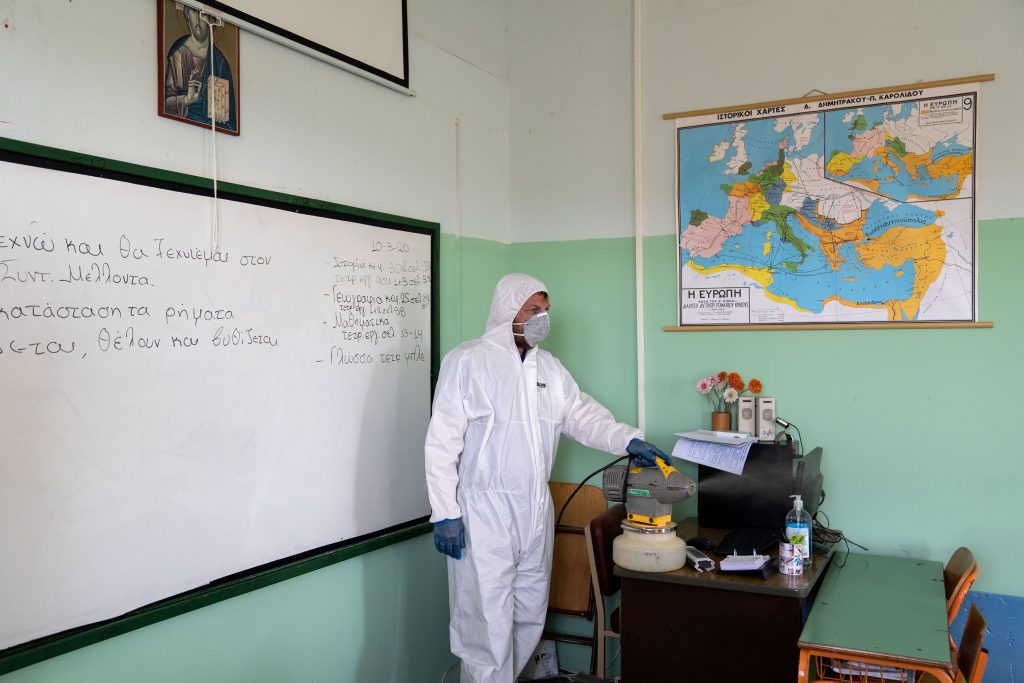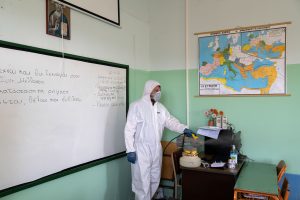Pediatricians across Greece are working to clarify widespread confusion about streptococcus infections — particularly how they spread, how dangerous they can be, and what preventative measures are actually effective — according to the Panhellenic Federation of Private Pediatricians. This effort follows growing public concern, seen in extensive school disinfections and temporary closures in response to recent outbreaks.
According to the Federation, there has been a recent uptick in cases of streptococcal pharyngitis, primarily in schools located in Northern Greece and other regions. However, pediatricians emphasize that this increase aligns with typical seasonal trends. As they explain, Group A Streptococcus (GAS) bacteria circulate throughout the year but tend to peak in late winter and early summer.
How Streptococcus Spreads
Group A beta-hemolytic streptococcus (Streptococcus pyogenes) is mainly transmitted through respiratory droplets from an infected person’s throat or nose, according to the Federation. They note that this can happen via direct contact — such as sneezing, coughing, or kissing — or indirectly through contaminated surfaces and objects.
The Federation clarifies that while the bacterium does not survive long in dry environments, it can persist for hours or even days on moist surfaces like toys, pencils, or desks. This can lead to secondary transmission, particularly in crowded settings with poor hygiene.
However, transmission through surfaces is considered secondary. According to guidelines from the European Centre for Disease Prevention and Control (ECDC, 2023) and the U.S. Centers for Disease Control and Prevention (CDC), person-to-person transmission through respiratory droplets remains the primary route of spread. The CDC further notes that group A strep bacteria do not spread through pets, and environmental transmission — though possible — is uncommon.
Should Schools Be Disinfected or Closed?
In response to rising cases, some schools have carried out mass disinfections or suspended classes. However, the Federation stresses that such actions are usually unnecessary. According to the organization, closures should only be considered in the event of confirmed, widespread transmission with a high number of hospitalizations or severe cases — and only following official public health recommendations.
When Should Sick Children Stay Home?
According to the authors of the relevant informational statement — signed by the president and secretary of the Federation, Kostas Dalloukas and Ioannis Ritsas — children with symptoms such as fever, sore throat, or rash should not attend school. They add that a pediatrician is responsible for confirming the diagnosis and determining whether treatment is necessary.
Streptococcal infection is typically confirmed either through a rapid antigen detection test or a throat swab culture. According to the Federation, once a child begins appropriate antibiotic treatment, they are no longer considered contagious after 24 hours — assuming their general health is stable — and may safely return to school.
The Role of Hygiene and School Staff
The Federation recommends that school personnel consistently reinforce handwashing, respiratory etiquette (covering the mouth and nose when coughing or sneezing), and the avoidance of sharing personal items, to reduce the risk of transmission.
Are Strep Tests Like COVID or Flu Self-Tests?
Not quite. Rapid strep tests should only be used when a child displays clear symptoms of streptococcal pharyngitis, according to the Federation. They caution that the proper collection of throat swabs and interpretation of results require medical training and should not be done at home or in pharmacies.
Incorrect usage of these tests may lead to false positives or negatives — particularly in asymptomatic children — and could result in unnecessary antibiotic treatments or failure to identify actual infections. According to the Federation, using these tests out of fear or uncertainty, without medical supervision, does not benefit public health.
Guidance for Parents
In their statement, the Federation urges parents to stay alert for symptoms and consult their pediatrician promptly when illness is suspected. According to the CDC, many sore throats are caused by viruses and do not require antibiotics. However, if symptoms are persistent or severe, or if the child is at risk for complications, medical evaluation is crucial.
Most streptococcal infections are mild and self-limiting, according to the UK’s National Health Service (NHS). In rare cases, however, the bacteria can lead to more severe illnesses such as scarlet fever, pneumonia, or invasive conditions like necrotizing fasciitis and toxic shock syndrome. Vulnerable groups include infants, the elderly, immunocompromised individuals, and those with underlying health conditions.







